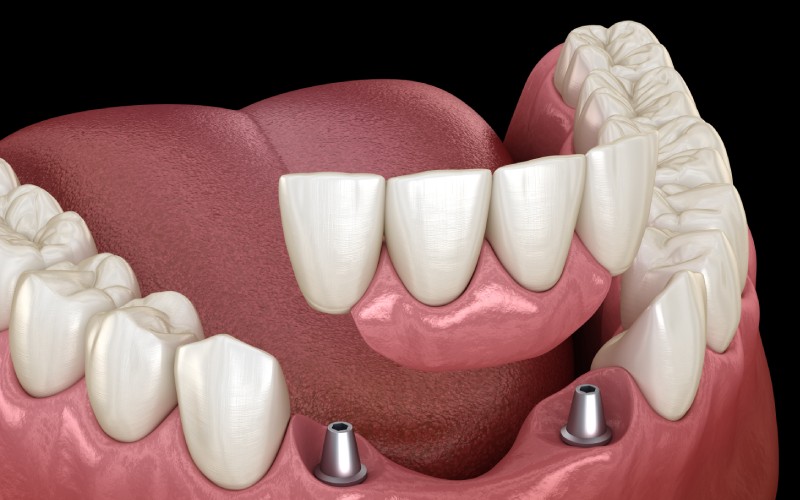Dental bridges are an effective solution for those who are missing teeth. These custom-made prosthetic devices provide artificial teeth to fill a gap created by one or more lost teeth.
Table of Contents
ToggleWhat Are Dental Bridges?
Dental bridges are sets of artificial teeth designed to replace missing teeth. They are custom-fitted to your mouth to fit well and be comfortable, and are affixed permanently into your mouth, unlike dentures, which are removable. The artificial teeth in these devices are known as pontics and are anchored to either your adjacent natural teeth, known as abutment teeth, or dental implants. If they are attached to natural teeth, crowns are usually placed on the abutment teeth to strengthen them.
Types of Dental Bridges
There are several types of dental bridges. Each one is designed for a specific purpose or situation.
Traditional Bridges
This is the most common type of bridge. It consists of one or more pontics held in place by dental crowns that have been cemented onto the natural teeth adjacent to the gap.
Cantilever Bridges
A cantilever bridge uses a dental crown for support, like a traditional bridge, but they are anchored to only one tooth, unlike a traditional bridge. They are used where affixing to two teeth is not possible.
Implant-Supported Bridges
These bridges are anchored to dental implants that have been surgically placed into the jawbone, instead of onto crowned natural teeth. Implants are good for providing a stable base for the bridge when the abutment teeth are not strong enough to support it; furthermore, the artificial tooth root portion of a dental implant helps to prevent bone loss.
How Dental Bridges Work
Dental bridges are sturdy, effective replacements for missing teeth. They work by blending in with the rest of your teeth, by looking like natural teeth and by working like natural teeth when you speak and eat. The artificial teeth act as an extension of your real teeth to correct the appearance of a gap.
The artificial teeth, or pontics, are carefully made to mimic your natural teeth, in colour, size, shape, and alignment, so they look natural and work well with the rest of your teeth. Anchored by abutment teeth or dental implants, these pontics (the replacement, artificial teeth) bridge your gap where you are missing teeth. The anchors and framework firmly secure the bridge in place, offering good stability when you are chewing and speaking, preventing the artificial teeth from slipping or causing other issues.
By redistributing the forces exerted on your remaining teeth and by preventing them from shifting towards the gap, dental bridges maintain proper bite and tooth alignment, preserving the integrity of your entire dental arch, and preventing wear and tear on the remaining teeth.

Benefits of Dental Bridges
Bridges let you eat and speak more easily again, compared to trying to do these activities with a gap from missing teeth. They are secure, and are unlikely to slip or shift.
They maintain the space in a gap and ensure the surrounding teeth remain properly aligned, preventing other teeth from shifting, and reducing the risk of misalignment, gum disease, and temporomandibular joint (TMJ) disorders.
Dental bridges also cover the appearance of a gap, so no one will notice you are missing teeth. Bridges also prevent the facial muscles from sagging due to tooth loss.
How Are Bridges Placed?
The process starts with a comprehensive examination, during which your dentist assesses your oral health, discusses options, and creates a treatment plan.
For traditional and cantilever bridges, the abutment teeth are prepared by removing a portion of enamel to allow the crowns to fit. Impressions of the prepared teeth are then taken to create accurate moulds for the bridge.
You may be given a temporary bridge while your permanent one is being made. When your custom bridge is ready, it is carefully fitted and cemented or bonded into place. Your dentist will ensure proper alignment and bite before finalizing the placement.

Caring for Your Dental Bridges
Proper care is essential to maintain the longevity and effectiveness of dental bridges. Regular brushing and flossing around the bridge area prevents plaque buildup. You may be advised to use specialized dental floss or interdental brushes to clean hard-to-reach areas like under the bridge. Routine dental visits are important to monitor your bridge and oral health, so any concerns can be addressed promptly. You should avoid chewing or biting on hard objects, and using teeth as tools to prevent damage.
If you have missing teeth, to see if a dental bridge is the right solution for you and to discuss options, book an appointment with Gateshead Dental. We offer a variety of tooth replacement options to help you.
He’s completed a number of additional courses to best serve his patients and be able to educate them too. No matter your age or dental condition Dr. Sims can assist you in a professional manner and loves answering any of your questions or concerns.
- How to Care for Dental Implants - April 26, 2024
- Is It Safe to Have Dental Work Done During Pregnancy? - February 28, 2024
- How Does A Dental Bridge Work? - January 17, 2024
